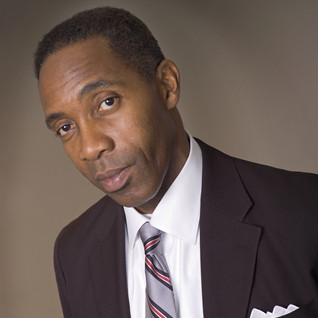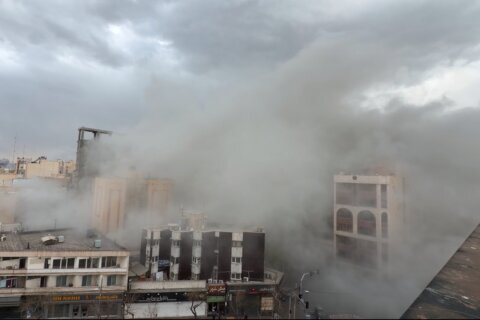WASHINGTON — If the momentum of a U.S.-led coalition is any indicator, the black flag of the Islamic State of Iraq and the Levant (ISIS) may be completely eradicated from Syria and Iraq in a matter of months.
But the head of the National Counterterrorism Center warns that the black cloud of ISIS terrorism will not dissipate the day after the caliphate falls.
“Part of the challenge is that I don’t think there will be a single ‘day after’ moment, when we think about our war against ISIS, in particular the war against ISIS in Iraq and Syria,” said Nick Rasmussen in an exclusive interview.
While he lauded the multi-disciplined, international intelligence, military and security effort to disrupt and destroy the group, he cautioned against premature optimism.
“There is no question that we’ve made tremendous progress in our effort to shrink the size of the caliphate; to squeeze ISIS leadership into smaller and smaller spaces, put more pressure on them and make it more difficult for ISIS leadership to organize attacks in various locations around the world.”
Widened influence
But as the fight to destroy the group has wound through a complex and time-consuming process, Rasmussen believes ISIS’ poisonous creed has seeped into the global internet culture and triggered terrorist activity that may not yet be obvious.
“The ideology that ISIS has spawned and has advanced is already, in a sense, a genie that is out of the bottle. Many of the individuals I’ve spoken about who are inspired, motivated or mobilized to act by that ideology are in a sense already in motion,” Rasmussen said.
A Western intelligence source told WTOP that the relentless pressure on ISIS has resulted in fissures in the once-cohesive organization, which is responsible for brutal attacks that claimed the lives of thousands — with much of the carnage transmitted in near real time on the internet.
“The killing of ISIS’ propaganda architects in Iraq and Syria has disrupted its communications apparatus and has significantly reduced the amount of material the group is able to disseminate,” said the source.
“Another key problem,” according to the source, “is the inability to coordinate their propaganda with their attacks because many commanders and fighters have left Mosul and Raqqa.”
Marine Gen. Rick Uribe — who was a deputy commanding general of the Combined Joint Forces Land Component Command for Operation Inherent Resolve in Iraq — agreed with the assessment during an interview in early June.
“They probably have some leadership left in Mosul, but the senior leadership left long ago,” he said.
‘They left martyrs’
The fleeing ISIS leaders left placeholders behind, Uribe said — a true sign that ISIS realized the fight was unwinnable.
“They left martyrs in my opinions in downtown Mosul, with orders to fight to the death, and they escaped more than likely to the west — toward Syria, possibly to al-Qaim or other areas along the Euphrates River valley.”
But even after routing all vestiges of the terror group out of their base, Rasmussen expects a lag between that and the reduction in ISIS-related terrorism.
“The defeat of ISIS on the battlefield is an important and critical step in shrinking the amount of terror we’re going to see around the world, but it won’t shut off all at once,” Rasmussen said. “We were going to be dealing with the ISIS ideology for a significant period of time even after ISIS is defeated on the battlefield.”
ISIS has set up affiliates across the Middle East, north and west Africa, and central and east Asia. But while the leadership is obviously on the run and looking for a permissive environment from which to run its operations, Rasmussen — like his partners at other U.S. intelligence and security agencies — indicate a fixed address is not necessary.
A decentralized global presence
“That model may be changing. We may be looking at an ISIS movement that has a global presence, but not necessarily a single headquarters location,” he said.
The internet has already provided new and discreet locations to conduct their operations. And their tradecraft is constantly changing.
“The days when we could count on terrorists using email messages back and forth in which they shared, in great detail, the thinking and planning about what they were doing — those days are over,” said Rasmussen.
And terrorists in this new era, he said, have a distinct advantage.
“Most terrorist organizations”, said Rasmussen, “now have such ready access to new technologies, including those with encryption capabilities. It’s much easier for them to carry out the kind of communications they carried out before with much more confidence that we are not able to listen to those communications.
“That’s a significant disadvantage we now suffer that we didn’t suffer from in previous years.”
That advantage is especially concerning to Rasmussen’s partners at DHS.
Secretary John Kelly, on Wednesday, while announcing new measures to better secure international flights to the U.S., alluded to the need to stay ahead of the sophisticated and evolving tactics terrorists are using.
“It is time to raise the global baseline of aviation security,” said Kelly. “We cannot play international whack-a-mole with each new threat.”
Terrorists and sympathizers from Flint, Michigan, and Manchester, England to Paris, France, and well beyond have access to the sophisticated anonymity that encryption offers. And some have reportedly used it to plot very mundane but deadly attacks using vehicles and knives.
“They will often use whatever tools or capabilities that are easily within their grasp, whether that’s a knife or a gun or increasingly vehicles. Some of that comes from their own initiative, but some of that comes from instructions and guidance they’ve received from overseas from organizations like ISIS,” Rasmussen said.
That instruction, according to several international intelligence officials WTOP spoke to, comes via encrypted applications.
Even though “the genie is out of the bottle,” Rasmussen is prepared for a long fight against ISIS and other terrorists like al-Qaida, and he is convinced that the intense pressure on them will lead to their defeat.
But he, too, feels the pressure of the moment.
“What we need to do to stay ahead of that threat here at NCTC involves both people and technology,” Rasmussen said. “I’m confident that we’re going to be able to hire and train and keep and retain the very best and brightest young people who want to serve in the national security world and want to serve their country.
“But there’s also pressure on us in leadership positions to provide them with the technology and the tools that they need to do their jobs. That’s a pressure I feel every day.”







